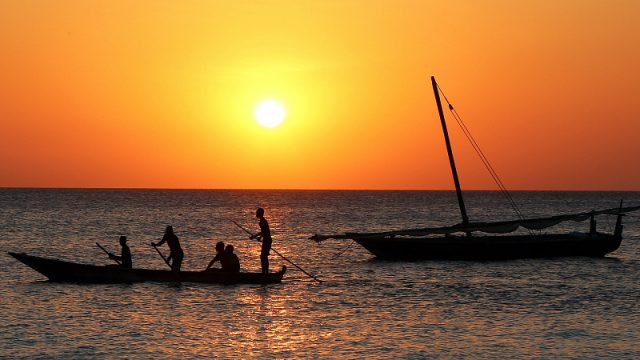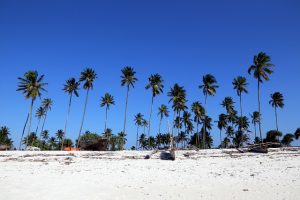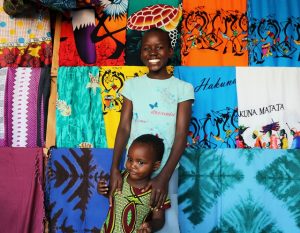Night has fallen at the Baraka Beach Restaurant. We sit at a table stuck right in the sand, 20 feet from the receding tide. A small candle casts a shallow pool of light just bright enough to illuminate my bowl of lobster curry. I can’t really see what’s in the bowl but the fragrant, spicy smell is all I need to tell me that I’m about to eat something delicious.
Several small boats bob in the ocean, anchored just off the beach in the inky darkness. Suddenly a dhow floats in between the anchored boats. A lone fisherman alights and pulls himself up to the beach in a dingy. He is immediately surrounded by a large circle of people, materializing from all directions.
The group chatters in Swahili as my friend Michelle and I strain to see what’s happening. Money changes hands. One man walks away from the circle with a fish the length of his forearm. Others depart with smaller catches. Soon, the group has melted away and I turn back to my dimly lit lobster curry. Despite costing less than US$10, it tastes even better than it smells.
Nungwi, a fishing-village-turned-tourist-playground on the northern tip of Zanzibar, is known as a Zanzibar party hub. But we’re here in early July, during Ramadan and right at the start of the high season. Nungwi is quiet, downright peaceful, with only a smattering of tourists. We have the restaurants nearly to ourselves and we’re the sole guests at our hotel, the Sazani Beach Lodge, which is a five-minute taxi ride from town.
Sazani Beach Lodge, a collection of 10 thatched, bungalow-style rooms that have seen better days, has a deserted-island feel. The reception area is dead quiet and the staff seems bored, if accommodating. But the pristine, nearly empty beach and the tasty homemade food more than make up for the listless feel of the lodge. The price is right, too, at $130 per night for a double room (including breakfast) during high season.
Michelle and I relax in the shade on rickety lounge chairs and gaze out at the snow-white sand and clear, azure water. We enjoy lazy lunches and dinners alone in the dining area, sharing our fresh fish with the local cat and dog.
When we crave a dose of luxury we walk next door to the Ras Nungwi Beach Hotel, where clients laze by the pool with fancy cocktails. We order wine at the bar and relax on giant cushions scattered on the elegantly carved wooden chaise lounges, accepting small plates of nuts and other free snacks from the handsome Ras Nungwi bartender.
Ras Nungwi is also home to Divine Diving, a small watersports outlet offering scuba, snorkeling, and yoga breathing techniques. (Yogic breathing helps scuba divers to breathe under water.) Michelle, an experienced diver, convinces me to tag along on a half-day scuba/snorkeling trip to a reef off the nearby Mnemba atoll. The water is beautiful but choppy; I’m lucky to have seasickness pills and a large bottle of sunblock.
We anchor near the reef and a pod of dolphins swims past. While Michelle and the other divers strap on their tanks and disappear beneath the waves, I join the snorkelers for a swim around the reef. Once I get used to breathing through my snorkel and navigating the waves, I start seeing fish – black, white, yellow, neon purple and green. I instinctively reach out and try to touch the large schools, which easily dodge my fingers.
The hour-long swim is a workout; back on the boat I devour three tasty vegetarian roti wraps, which tide me over during the long sail back to Nungwi.
When we get bored with diving and lazing on the beach, Michelle and I head into town. Nungwi village is a 30-minute walk from Sazani, either via the beach (only walkable at low tide) or the road. Halfway between Sazani and Nungwi Beach is the ultra-lux Essque Zalu Zanzibar, right at the point on the northern tip of the island. The restaurant/bar at the end of the long jetty serves elegant cocktails and offers a spectacular view of the sunset.
Further down the beach, Coco Cabana is our favorite casual hangout in the center of Nungwi. Coco Cabana is a beach bar catering to backpackers and sports fans, and Michelle is overjoyed to find that it’s airing Wimbledon. We park ourselves at the bar, order pina coladas, and Michelle fiercely protects the television from the British cricket fans at a nearby table. I alternate between watching tennis, checking out the soccer and volleyball games on the beach, and shooting pictures of the sun as it drops behind the horizon in a red-orange blaze.
On our last afternoon in Nungwi, after enjoying a pizza topped with local prawns at Mama Mia’s Italian restaurant, we decide to walk through the village on the way back to our hotel. Walking through the village is a welcome change from the beach, where fending off the persistent touts hawking sunset cruises, snorkeling tours, and cheap jewelry becomes tiresome.
We use the scarves we just bought at a tiny souvenir shop to cover ourselves; Zanzibar is primarily Muslim and beach attire isn’t acceptable away from the beach. We stroll down the dirt road, passing batik-painting vendors, shoe repair stalls, and stray chickens. A small storefront, the “New Happy Tailoring & Gift Shop,” catches my eye.
Two little girls, Magdalena and Jetfedder, welcome us into the shop. Their mother works at a sewing machine and the walls are covered in fabric: brightly colored Dutch wax prints and kangas that cheerfully pronounce “Hakuna Matata,” the mantra of all Zanzibaris. I buy a large square of orange and blue cloth (not sure what I’ll do with it but I can’t leave this shop without buying something) for a few dollars and conduct a brief photo-shoot with Magdalena and Jetfedder, who bask in front of the camera. The girls wave enthusiastically as we continue down the road.
I’ll remember many things about Nungwi: the sunsets, the tropical fruit, the technicolor fish, the lobster curry. But I’ll remember Magdalena and Jetfedder most of all.




